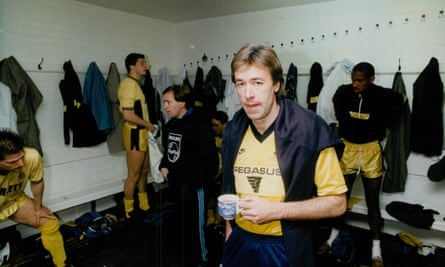Back when football was good – 1989-1992 to be precise – Cambridge United were on an unlikely surge from the Fourth Division to within a couple of games of the inaugural Premier League season. Defeat by Leicester in the playoffs ended any realistic hope of ever reaching the Promised Land™.
There was a lot I didn’t notice at the time from my seat in the Junior U’s enclosure, namely all of it apart from the goals. It was just Dion Dublin and John Taylor heading in loads of crosses. I certainly wasn’t aware of all the tactics the manager, John Beck, employed to frustrate the opposition.
For those that don’t know, Beck came from the POMO school, Position of Maximum Opportunity. In other words, get it launched, stick it in the mixer, hit the channels. Some accounts suggest he quite sensationally gave cash bonuses to whichever player kicked the ball the furthest. It was wildly successful, until it wasn’t.
Added to that was making life simply horrible for the opposition. When it was hot, he turned the thermostat on full whack in the away dressing room, when it was cold he turned it off. He put skip-loads of sand in the corners of the pitch so the ball would just stop there. He wanted the pitch in such a terrible condition that he signed a letter to the groundsman, Ian Darler, confirming that the groundsman, Ian Darler, wasn’t responsible for the state of the pitch.
He moved the away dugout almost to the corner flag. He gave the opposition saturated, sodden footballs to warm up with. Apparently, for away games, he’d take the under-18s and get them to play an 11-a-side match on our half of the pitch before kick-off to cut it up as much as they could.
These tactics didn’t necessarily have a name in the 90s, but now Beck would be held up as a Jedi Master of the Dark Arts. He is just one example from football’s past, which makes it slightly confusing that Mikel Arteta seems to have been accused in some quarters of inventing it in the second half at the Etihad on Sunday.
The arts themselves have changed slightly with the times – there’s every chance Arsenal took their own footballs to Manchester – but they’ve been around for ever. If you want to see time-wasting, just watch any game of football before the backpass rule. All Arsenal really did was slow the game down and who wouldn’t a goal up and a man down away at the best team in the country? That is not to say that watching David Raya repeatedly catching the ball, landing comfortably on both feet and then falling achingly slowly to the ground didn’t bring on a surge of anger, growing incrementally with each collapse.

Goalkeepers are the push puppets for the TikTok generation: make Ederson crumple in a heap with a press of a button. Pretend Southampton are holding a lead late at Everton in the comfort of your own home with your own mini Aaron Ramsdale. Goalkeepers are uniquely placed to waste time. You could probably make a rudimentary carbonara in the time between the ball going behind and Nick Pope taking a goal-kick if Newcastle are trying to protect a lead.
Dark Arts implies secrecy. The 70s and 80s had their two-footed lunges, rakes down the ankles and lamping someone when the ref wasn’t looking. Were they simply “The Arts”? Picking up the ball to take a throw and holding it for a while before gently letting it roll down your back for a teammate to pick up feels marginally less egregious than breaking someone’s jaw.
Fans’ frustrations are often aimed squarely at match officials, as if players and managers bear no responsibility. It is true there are laws aimed to cut out this kind of game management. Kicking the ball away is having its moment. How well is that going for all of us?
Refs could do the same for the six-second law but can you imagine the howls for consistency and common sense from every corner of the internet? How much did everyone hate it when they started adding on the correct amount of injury time? And you can’t prove someone doesn’t have cramp, even if it only happens to players when they’re winning.
after newsletter promotion
In a cursory Google, I discovered a 2020 textbook called Football Dark Arts offering “outrageous gamesmanship that will help you and your team win matches”. There are 52 pages on time-wasting (20 of those for goalkeepers) before it moves into sections on the abusive dark arts, including spitting and biting and the Reckless Deceptions chapter, which adds acronyms for “Boot Over the Top” (BOTT) and “Leave a Bit On” (LOBO).
I found only the intro for free so I can’t tell you what the page on “Pushing Buttons: Other Body Parts” describes. But as someone who has been the victim of a finger up the bum during a game, I’m not sure how much explaining is required.
We are hypocrites in all aspects of life (many congratulations if you aren’t) and this is never more true than in football. We all want our team to win at virtually any cost. We enjoy basic, mainly non-violent, cheating if it helps get the result and we despise it if we’re on the receiving end. We love the “scenes you really don’t want to see” at the elite level, but hate the idea of our kids replicating any of this stuff when they play.
Who were the last truly successful team who played completely by the rules? Maybe Real Madrid with Pepe and Ramos or Sir Alex and his unwavering commitment to respecting referees. Maybe Liverpool in the 80s – Graeme Souness notably the last top-flight midfielder never to commit a foul. Leeds in the 70s so clean their kits never got dirty, even on those pitches. The list isn’t endless – in fact, there probably isn’t a team on it.

 By The Guardian (Sports, Football) | Created at 2024-09-26 13:22:51 | Updated at 2024-09-30 07:19:17
3 days ago
By The Guardian (Sports, Football) | Created at 2024-09-26 13:22:51 | Updated at 2024-09-30 07:19:17
3 days ago



